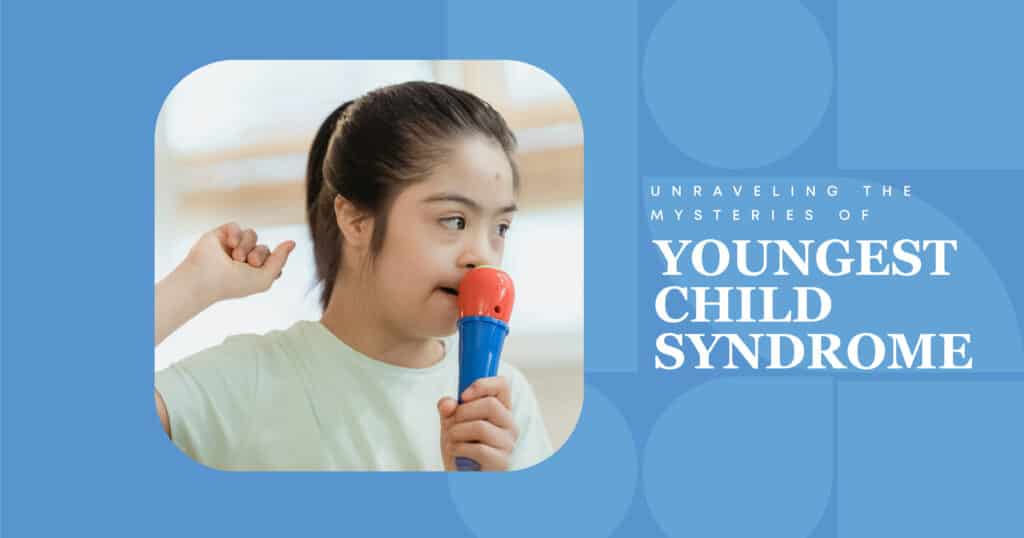Every family dynamic is unique, but the youngest child syndrome is common in many families. This refers to a set of behaviors or traits typically observed in the youngest child of a family, often shaped by sibling rivalry, parental influence, and family expectations. Though every child is unique, the youngest usually experiences specific pressures and influences that shape their personality and behavior. In this article, we’ll dive deeper into the effects of youngest child syndrome, exploring sibling rivalry, attention-seeking behaviors, spoiled behavior, family dynamics, and much more.
Sibling Rivalry in Youngest Child Syndrome
Sibling rivalry plays a significant role in developing the youngest child syndrome. The youngest child often navigates complex relationships with their older siblings, which can create both challenges and growth opportunities.
Here are some key factors contributing to sibling rivalry in the youngest child:
- Competition for Attention. The youngest child may feel the need to compete for the attention and affection of their parents, which can fuel rivalry.
- Desire to Stand Out. The youngest may try to differentiate themselves from older siblings, often engaging in behaviors to gain attention.
- Seeking Approval. The youngest often wants approval from older siblings and parents, sometimes leading to frustration if their efforts aren’t recognized.

Below is a table summarizing the dynamics of sibling rivalry in the youngest children and its impact:
| Siblings Factor | Impact on Youngest Child |
| Attention Seeking | The youngest child often competes for parental attention, leading to frustration or assertiveness. |
| Desire to stand out | May engage in behaviors to differentiate themselves from older siblings. |
| Approval seeking | May struggle with feeling validated by older siblings or parents, which can increase rivalry. |
Attention-Seeking Behaviors Among Youngest Children
Attention-seeking behaviors are common in many of the youngest children and can be attributed to birth order traits. These behaviors often arise from the youngest child’s need for validation and reassurance, especially in a family where older siblings are more independent.
Here are some typical attention-seeking behaviors seen in the youngest children:
- Seeking Parental Validation, The youngest child may constantly seek reassurance or validation from parents, especially when older siblings are more independent.
- Displaying Exaggerated Emotions. Sometimes, the youngest children may use exaggerated behaviors (e.g., tantrums or crying) to draw attention to themselves.
- Imitating Older Siblings. They may mimic the behavior of older siblings, attempting to match or surpass them in certain areas to gain more focus.
Understanding these behaviors is essential to avoid reinforcing negative attention-seeking patterns, which can further complicate family dynamics.
Spoiled Behavior and Family Dynamics
Spoiled behavior is often associated with the youngest child, mainly due to the family dynamics in play. Parental overindulgence, a lack of responsibilities, and the youngest child’s position in the family can all contribute to spoiled behaviors.
The following factors often contribute to the development of spoiled behaviors in the youngest children:
- Parental Overindulgence. Parents often pamper the youngest children more and are more lenient, making them feel entitled to certain privileges.
- Less Responsibility. The youngest child often doesn’t have the same responsibilities as older siblings, which can foster a sense of entitlement.
- Lack of Consequences. Since parents may sometimes overlook or tolerate their spoiled behaviors, the child may fail to understand the importance of consequences.
Here’s a table explaining the spoiled behavior linked to youngest child syndrome and how family dynamics influence it:
| Family Dynamics Factor | Influence on Youngest Child’s Behavior |
| Parental Overindulgence | This leads to spoiled behavior, as parents pamper and indulge their youngest child. |
| Less Responsibility | The youngest often does not have the exact expectations placed on them, fostering entitlement. |
| Lack of Consequences | Indulgent parenting may lead to spoiled behaviors, as consequences for actions are less emphasized. |
While spoiled behavior can seem harmless in the short term, it can hinder emotional growth and cause issues in relationships later on.
The Impact of Birth Order Traits on Youngest Children
Birth order traits heavily influence the behavior of all siblings, especially the youngest. Youngest child syndrome is closely tied to these traits, as the youngest child typically has a unique position in the family.
Here’s how birth order traits affect the youngest child:
- Attention from Parents. Unlike the older siblings, the youngest tends to receive undivided attention, often leading to more pampered treatment.
- Learning from Older Siblings. Youngest children are often keen observers, learning from the successes and failures of their older siblings, which can lead to heightened expectations.
- Pressure to Succeed. Despite being the youngest, they may need to prove themselves, especially if older siblings have excelled in certain areas.
These traits influence the youngest child’s development, causing them to balance dependence and independence as they navigate their position in the family.
Parental Influence on Youngest Child Syndrome
Parents play a crucial role in the development of the youngest child syndrome. Their attitudes, expectations, and treatment of the youngest child can significantly shape their behaviors.
Here’s how parental influence affects the youngest child:
Competitive Behavior in Youngest Siblings
- Desire for Parental Approval. The youngest may compete with their siblings for parental approval, especially when parents spoil or pamper them.
- Striving to Be Different. To stand out, the youngest may often develop unique ways of expressing themselves, leading to competitive behavior.
- Negative Reinforcement. Sometimes, if parents respond too harshly to certain behaviors, the child may develop a pattern of competitive behavior out of fear of rejection.
Dependency Issues and Their Roots in Family Dynamics
Dependency issues in the youngest child are often rooted in family dynamics, as the youngest child is typically more reliant on their parents for care and attention.
Here’s how dependency issues arise in the youngest child:

- Excessive Reliance on Parents. The youngest child might lean heavily on their parents for emotional and physical support.
- Reluctance to Be Independent. Due to the overprotectiveness of parents, the youngest may struggle with becoming independent, leading to dependency issues.
- Difficulty Handling Challenges. Without the same level of responsibility placed on older siblings, the youngest child may lack the skills needed to cope with problems.
Helping the youngest child build self-sufficiency is essential for their emotional and psychological growth.
Support Your Youngest with Insight From Hillside Horizon for Teens
At Hillside Horizon for Teens, we understand the importance of nurturing the emotional and psychological well-being of the youngest child. Our programs help address the unique challenges, such as sibling rivalry, dependency issues, and attention-seeking behaviors. By offering guidance and insight, we support the youngest in developing their confidence, independence, and emotional resilience.
Contact Hillside Horizon for Teens to learn how we can help your youngest thrive.
FAQs
- How does sibling rivalry manifest in youngest child syndrome and affect family dynamics?
Sibling rivalry in the youngest child syndrome stems from competition for parental attention, leading to sibling tensions. The youngest often seeks recognition, which can create emotional challenges. These rivalries also present opportunities for growth and learning.
- What are common attention-seeking behaviors seen in the youngest children due to birth order traits?
The youngest child often engages in attention-seeking behaviors, such as tantrums or exaggerated emotional expressions, which stem from their need for validation. Imitating older siblings is another common method of gaining parental focus and approval.
- How does parental influence contribute to spoiled behavior in the youngest child?
Parents often indulge the youngest child, resulting in spoiled behaviors and a sense of entitlement. They may receive more leniency and pampering. The absence of responsibilities and consequences reinforces this behavior, further complicating their development.
- In what ways does competitive behavior impact sibling relationships in families with a youngest child?
Competitive behavior can lead to sibling rivalry, causing tension between the youngest child and older siblings. However, this behavior encourages the youngest to strive for success and helps them develop independence as they seek parental approval.
- What dependency issues are commonly observed in the youngest child and how do they originate within family dynamics?
Dependency issues arise from overprotective parenting, which makes the youngest child overly reliant on parental support. The youngest often struggles with independence due to the lack of responsibility placed on them. This dynamic can hinder their emotional and psychological growth.




